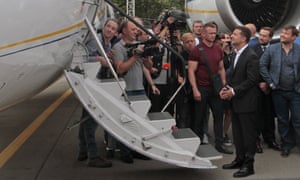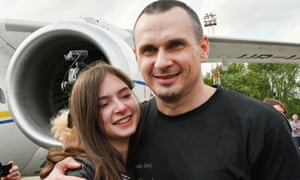Kyiv and Moscow have exchanged dozens of prisoners in a dramatic operation that resulted in freedom for 24 Ukrainian sailors taken captive by Russia, as well as a potential suspect and key witness in the downing of Malaysia Airlines flight MH17.
The Ukrainian president, Volodymyr Zelenskiy, was on the tarmac at Kyiv’s Boryspil airport to greet the prisoners released by Russia on Saturday morning. There were emotional scenes as family members were reunited on the runway.
Oleg Sentsov, a Ukrainian film-maker sentenced to 20 years’ prison in Russia on controversial ‘“terror” charges in 2015, was among those returning home.

Both countries freed 35 prisoners as part of the exchange, the first since 2014, when Russia annexed Crimea from Ukraine and Kremlin-backed separatists carved out two so-called people’s republics in eastern Ukraine.
“We have done everything we promised,” said Zelenskiy. He said he hoped the exchange was the first step in increased efforts to bring peace to war-torn east Ukraine, where more than 13,000 people have died in ongoing fighting.
The Ukrainian sailors were seized by Russia in November after their navy vessels tried to pass through the Kerch Strait, a narrow waterway between the Russian mainland and Crimea. Moscow charged them with illegally entering Russian territory, while Ukraine says they were in international waters.
The prisoner swap is a major domestic triumph for Zelenskiy. A comedian with no previous political experience, he came to power earlier this year after promising to bring Ukrainian prisoners home from Russian jails.
The US president, Donald Trump, tweeted: “Russia and Ukraine just swapped large numbers of prisoners. Very good news, perhaps a first giant step to peace. Congratulations to both countries!”
The Russian president, Vladimir Putin, said on Thursday that the prisoner exchange would be “a good step” toward the normalisation of relations between Moscow and Kyiv. The Kremlin denies sending Russian troops to east Ukraine and says any Russians fighting there are “volunteers”.
The Russian foreign ministry said the historic prisoner exchange was the result of negotiations between Putin and Zelenskiy. “Unlike its predecessors, Zelenskiy’s administration has demonstrated a sensible approach and a willingness to compromise,” the ministry said. Rossiya 24, a Russian state television channel, described the exchange as a “long-awaited and joyous occasion”.
Putin did not greet the prisoners released by Ukraine, choosing to spend the afternoon at a rhythmic gymnastics display in Moscow.
The exchange comes ahead of an expected summit between Germany, France, Russia and Ukraine to discuss the conflict in eastern Ukraine. Angela Merkel, the German chancellor, praised the release of the prisoners as a “sign of hope”.
There was controversy, however, over Ukraine’s decision to hand over to Moscow a separatist commander thought to be involved in the downing of Malaysia Airlines MH17 in July 2014. Vladimir Tsemakh, who previously commanded a separatist air defence unit, was seized by Ukrainian special forces at his home in east Ukraine in June and brought to Kyiv. He had previously indicated that he had hidden evidence of a Buk missile system, the kind Dutch investigators say shot down the jet, killing all 298 people on board.
International investigators say the Buk was transported from a Russian military facility to east Ukraine on the day of the attack. Russia is reported to have insisted on the release of Tsemakh, a Ukrainian citizen, as a condition for Saturday’s prisoner exchange. His release came despite an appeal to Ukraine from 40 members of the European parliament, as well as EU foreign policy chief Federica Mogherini.

Stef Blok, the Dutch foreign minister, expressed disappointment over the decision to free Tsemakh. Of the 298 passengers killed when MH17 was shot down, 196 were Dutch citizens. The Netherlands later confirmed that it will seek Tesmakh’s extradition.
Tatiana Moskalkova, Russia’s human rights commissioner, said Russia would make Tsemakh available to international investigators. “He can either give evidence by video or travel to a court to testify and then return to Russia,” she said.
Zelenskiy said Tsemakh had been questioned by members of the joint investigative team into the downing of MH17 at the request of unnamed western leaders. “We did everything they asked of us,” he said. “It was hard … I was afraid that the prisoner exchange deal could collapse over this.”
Ivan Bakanov, the head of Ukraine’s SBU state security service, said Russia had threatened to walk away from talks on the exchange of prisoners if Kyiv refused to hand over Tsemakh.
“Moscow’s demand to include Tsemakh in the list [of prisoners to be freed] is more evidence of its involvement in the downing of MH17,” Bakanov said.
The Netherlands is expected to file a formal request for Russia to hand over Tsemakh. Although Russian law forbids it from extraditing its citizens, the law does not cover non-nationals.
“As of this moment, Russia is harboring a suspect in the murder of 298 civilians,” Christo Grozev, a member of the Bellingcat investigative journalism website that tracked the movements of the Buk missile from Russia to Ukraine, posted on Twitter.
Ukraine also freed Kyrylo Vyshynsky, a Ukrainian-born journalist who previously worked for Russia’s state-run Ria Novosti news agency in Kyiv. Vyshynsky was charged with treason by Ukraine, but was released on bail last month. Vyshynsky said he intended to return to Kyiv to “prove his innocence”.
Maksim Odintsov and Alexander Baranov, two former Ukrainian servicemen that Ukraine says defected to Russia during the Kremlin’s annexation of Crimea, were also released by Ukraine.
Sentsov urged Zelensky to work towards bringing home dozens of other Ukrainians in Russian jails, including Crimean Tartars arrested by Russia after its annexation of Crimea. Russia is still illegally holding over 100 Ukrainians, according to Kyiv.








